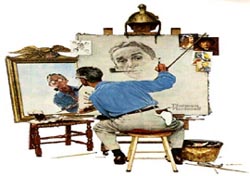Oct 20, 2025
Oct 20, 2025
 We are reminded constantly these days of the importance that self-esteem plays in a child's development. Children's self-esteem influences their social behavior and learning. Children with low self-esteem are less likely to step out of their comfort zones to extend themselves and try new experiences. They tend to take fewer risks than those with healthy level of self-esteem.
We are reminded constantly these days of the importance that self-esteem plays in a child's development. Children's self-esteem influences their social behavior and learning. Children with low self-esteem are less likely to step out of their comfort zones to extend themselves and try new experiences. They tend to take fewer risks than those with healthy level of self-esteem.
Misbehaving children are generally discouraged children. Lacking confidence to belong through positive ways they find their place within their family and peer group through misbehavior. Quite simply if children have a healthy level of esteem and feel good about themselves they are more likely to make friends and succeed at pre-school and at school.
But what is self-esteem and how do children acquire it? Self-esteem refers to the image or picture of ourselves that each of us carries around in our heads. This image or picture is constructed through our experiences and is strongly influenced by the messages that others send. The way we interact with children on a daily basis influences the positive picture that they construct of themselves. Let them know through our language and our behavior that they are capable and worthwhile and they will begin to believe it. The messages we send to children influences they way they see themselves as well as our relationship with them.
For parents the essential question is: What type of self image are you helping your children to construct?
While children have countless experiences in settings outside their home and receive messages from many sources including their peers, parents have a huge influence on the way children see them. In fact, when children are very young their sense of self is linked to their parents so a parent's self-esteem is obviously important a determinant in a child's self-esteem.
Children with a healthy level of self-esteem generally:
Following are some ideas that adults can use to promote self-esteem in children:
04-Jan-2000
More by : Michael Grose